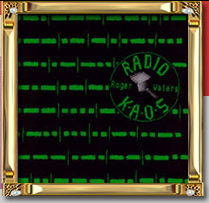
 |
|
 |
 |
|||
|
|
It's a time-tested assertion that the music of one’s youth has a certain resonance later music will never achieve. When you hear songs that you discovered in your teens and early twenties you percolate with a distinct emotional reaction: part simple nostalgia, but also a sense of actually being young again, of feeling the sensations and excitements of the young mind and body. Often, forgotten memories come flooding back.
I would argue that there's a distinct subcategory of this preference for the music of one's youth. It's the affection for music that you discovered for yourself. To clarify, let me recall my experience of learning to navigate through the seas of popular music when I was a kid in the 80s. At first I simply embraced what was easily accessible: the music on the radio and MTV. Michael Jackson, Prince, Devo and the like. (And don't get me wrong; I still love those guys.) Eventually I started getting exposed to music that was a little harder to find, particularly the music of prog-rock bands like Pink Floyd, YES and Rush. But I was still being fed my tastes. Friends would say "You should listen to this" and I would willingly oblige. There was a certain social pressure for me to like this music (though, again, I'm still a fan of those prog bands.)
Somewhere along the line, however, I stumbled across an album that was not being recommended to me by friends, and was not getting much radio airplay. I bought the album and listened to it obsessively over the summer of 1987. That album was Roger Water's "Radio K.A.O.S."
At the time, I was familiar with Waters; I knew he’d been the lead singer and songwriter of the 1970s iteration of quintessential prog-rock band, Pink Floyd. I knew Waters taken over leadership duties after Floyd's original lead singer, Syd Barrett, had mentally disintegrated. (To this day the Barrett and post-Barrett camps of Floyd fans are bitterly at odds.) Post-Barrett, Waters had led the band to its chart busting success with albums like "Dark Side of the Moon" and "The Wall. I had been a repeat viewer of the movie version of "The Wall" and was well versed in Floyd's music at the time "Radio K.A.O.S" was released. As with much of Floyd’s work, “Radio K.A.O.S” was a concept album; the songs worked together to tell a tale. In this case, it was story of a young paraplegic from England who moves to Los Angeles and begins to utilize a form of telepathy to interface with computers, eventually activating nuclear defense systems and bringing the world to the brink of nuclear war. Not real feel-good pop music. In both lyrics and composition "...K.A.O.S" was right in line with the classic Pink Floyd sound. So why was it not released as a Pink Floyd album? To understand one must first realizethat the Pink Floyd of the early 1980's was trapped in turbulent waters (pun intended.) The personal and creative relationship between Roger Waters and guitarist David Gilmour was roiling with acrimony. On top of that, the band's 1983 album “The Final Cut” was ill received by fans and critics alike. In 1984, while Waters was still in Pink Floyd, he released a solo album entitled "The Pros of Cons of Hitchhiking." (I heard it several years after hearing "...K.A.O.S." and, frankly, hated it, but I've come to find parts of it charming.) The album did well enough and probably gave Waters the sense that he could succeed as a solo artist. So he soon left Floyd and completed his second solo album, “Radio K.A.O.S.” But there was a problem. Right as Waters was debuted "...K.A.O.S.", Pink Floyd, now under the leadership of lead guitarist Gilmour, released what was something of a comeback album, "A Momentary Lapse of Reason." Additionally, both Waters and Floyd began touring for their respective albums and thus were symbolically battling it out on the charts and in performance halls. History, I suspect, would argue that Floyd won the battle. "A Momentary Lapse of Reason" is generally regarded as a success with songs that still get played on classic rock stations. "...K.A.O.S.," on the other hand, has a loyal cadre of fans but has largely sunk from cultural awareness. And that status is a shame since the album is filled with great tunes and operates well as a cohesive entity. When looking for explanation of what kept "K.A.O.S" from being more successful, blame is often cast on the album's production. It was produced in the very precise and mechanical style that was popular during the 80s, a style some view as antiseptic and cold. Waters himself has said... "Between Ian Ritchie and myself, we really fucked that record up. We tried too hard to make it sound modern. I allowed myself to get pushed down roads that were uncomfortable for me. I should never have made that record."Personally, I disagree. I think the clarity and attention to detail that are inherent in such a production style allowed the sonic subtleties of the album to be heard. Additionally such production was very in line with most prog music album from the 80s and beyond (the shimmer of Kevin Gilbert's Toy Matinee album comes to mind.) Despite whatever setbacks "Radio K.A.O.S." may or may not have brought to Water's career, in the long run he has prospered. In the 2000s he re-introduced the music of Floyd's "Dark Aide..." and "Wall" albums as very successful tours. In 2005 He had a reunion with his fellow Pink Floyd members at the British Live 8 concert. "Radio K.A.O.S" may be a footnote to his career but it's one deserving of close inspection.
View Wil's Acid Logic web log, a stirring endorsement of sex with pandas!
HOME
- LINKS - SEARCH
- BUY!!!
|
|
||||||